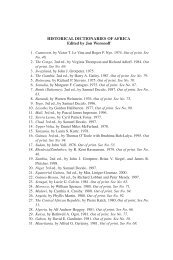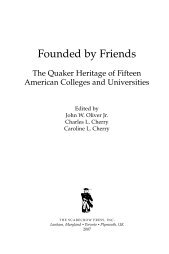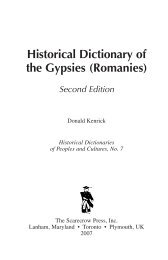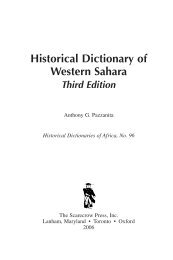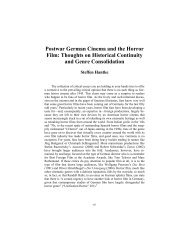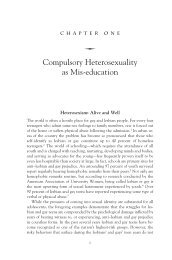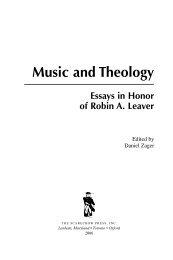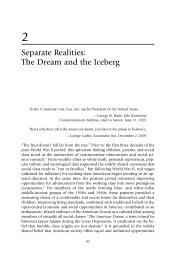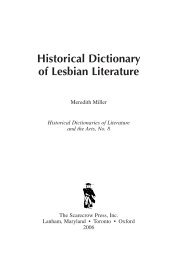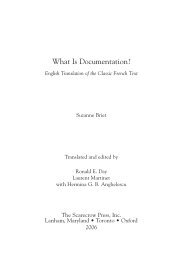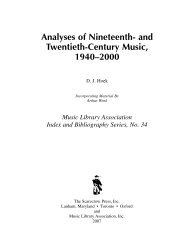Johann Nepomuk Hummel A Musician's Life and ... - Scarecrow Press
Johann Nepomuk Hummel A Musician's Life and ... - Scarecrow Press
Johann Nepomuk Hummel A Musician's Life and ... - Scarecrow Press
Create successful ePaper yourself
Turn your PDF publications into a flip-book with our unique Google optimized e-Paper software.
The Worlds of <strong>Johann</strong> <strong>Nepomuk</strong> <strong>Hummel</strong> 7<br />
educational reforms. Her efforts were supported <strong>and</strong> furthered by her son Joseph<br />
II, who was a staunch advocate of Enlightenment principles, at least as much as<br />
was possible for a Habsburg. He worked long hours <strong>and</strong>, like his mother, tried to<br />
make himself accessible to the “people.” He also attempted to foster a degree of<br />
religious freedom with his “Edict of Tolerance” of 1781, which abolished discrimination<br />
against Protestants <strong>and</strong> Greek Orthodox; later special legislation would allow<br />
Jews to settle in areas previously forbidden to them. University training for a<br />
number of professions was also made m<strong>and</strong>atory under his reign. Joseph II was<br />
succeeded by Leopold II (1747–1792; reigned 1790–1792), the older brother of<br />
Marie Antoinette, whose short <strong>and</strong> unhappy rule ended just six weeks before the<br />
French Assembly forced Louis XVI to declare war on his son <strong>and</strong> successor, Francis<br />
II (1768–1835; reigned 1792–1835). Francis II served as Holy Roman emperor<br />
from 1792 to 1806 <strong>and</strong> then as Francis I, emperor of Austria, until his death. Francis<br />
at first seemed to share many of the enlightened views of his predecessors. For<br />
example, he spent two full mornings each week receiving anyone who showed up<br />
to air a complaint or make a request. The Habsburg reform policies were put on<br />
hold, however, because of the numerous wars against Austria that ended only<br />
with the Congress of Vienna in 1814 <strong>and</strong> Wellington’s victory over Napoleon at<br />
Waterloo in 1815. Francis I was succeeded by Ferdin<strong>and</strong> I, the Benign (1793–1875),<br />
who served as emperor of Austria from 1835 to 1848. For further information on<br />
the Habsburg dynasty, see Andrew Wheatcroft, The Habsburgs (London: Viking,<br />
1995), <strong>and</strong> Robert A. Kann, A History of the Habsburg Empire 1526–1918 (Berkeley:<br />
University of California <strong>Press</strong>, 1974).<br />
3. For example, the population of Europe increased from one hundred twenty<br />
million people in 1700 to over one hundred ninety million in 1800. By the early<br />
nineteenth century, one-quarter million people had moved to London. A seventyfive<br />
percent reduction in transatlantic fares between 1815 <strong>and</strong> 1840 also meant that<br />
many Europeans left the continent entirely to take advantage of the burgeoning<br />
opportunities in the New World. For further information about the political, social,<br />
<strong>and</strong> cultural changes that occurred during this time, see Robert Gildea, Baricades<br />
<strong>and</strong> Borders, 2nd ed. (Oxford: Oxford University <strong>Press</strong>, 1996; 1st ed. 1987) <strong>and</strong><br />
T. C. W. Blanning, The Culture of Power <strong>and</strong> the Power of Culture (Oxford: Oxford<br />
University <strong>Press</strong>, 2002).<br />
4. Blanning, The Culture of Power, 137.<br />
5. One manifestation of this was “the replacement of aristocratic patrons by<br />
publishers as commissioning agents.” Blanning, The Culture of Power, 9.<br />
6. An important aspect of nationalism was the desire of each nationality to<br />
speak its native language. <strong>Johann</strong> Gottfried Herder had this in mind when he proposed<br />
the establishment of a “Patriotic Institute” to foster the use of a uniform<br />
German language in 1788, <strong>and</strong> he received full support from his patron, Duke Carl<br />
August of Weimar. Blanning, The Culture of Power, 258. The multiethnic, multilingual<br />
population of the Austro-Hungarian Empire provided particularly fertile soil<br />
for the growth of nationalism as well as other political movements. The majority<br />
of Habsburg subjects felt no real allegiance to the crown in Vienna since they were<br />
not bound by any common language, ethnic heritage, or history.<br />
7. We learn much about <strong>Hummel</strong>’s ancestors from a fragmentary autobiography<br />
that he wrote at some unknown date. It is printed in Dieter Zimmerschied,



